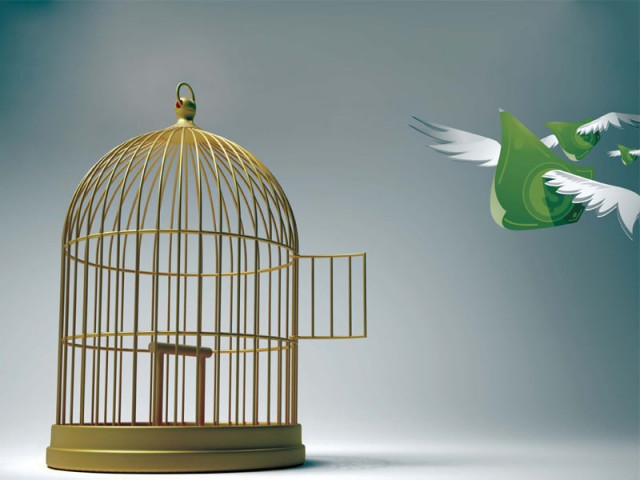Economic consequences of going it alone
Businessmen are prepared to withstand loss of US and IMF umbrella, though lack of government action disillusions them.

Strangely, the reporting on this meeting showed the two sides in the meeting talking at cross-purposes. The prime minister appeared to be replying to questions that were not posed. The questions as reported pertained to the Federal Bureau of Revenue, the law and order situation that had not improved and the ‘bhatta’ factor which continues as always. They also requested for measures to restore confidence among the business circles of Karachi, so as to enable long-term investment in the country. The crux of what they wanted was that in the aftermath of the worrisome signals from the US and Pakistan’s severing of ties with the IMF, the country could only overcome the crisis on its own, if the government provided a congenial environment to the business community and was prepared to take steps to address the situation.
The signals are indeed dire. The powers that be, above and beyond Prime Minister Gilani, had already spoken to break the heart of the business community: Pakistan was ready to take the consequences of its embrace of the Haqqani network and that it was the US that would suffer after losing Pakistan as an ally. As for the break with the IMF — after Finance Minister Abdul Hafeez Sheikh could convince neither the MQM within the government nor the PML-N in the opposition to implement the RGST (Reformed General Sales Tax) — it threatens the economy with ‘dollarisation’ and rampant inflation already standing at a level higher than any other South Asian economy. What the businessmen wanted was probably not within the grasp of Mr Gilani. They were of the opinion that if the US was to be defied and if the umbrella of the IMF was to be removed, then they could hold up their end of the bargain provided that law and order was restored. They made very concrete suggestions but did not receive concrete replies. The assurances that the prime minister held out were being belied on the ground at the very moment when he was articulating them. The pacification of Karachi is a long way off and may be overtaken by other crises triggered by the tiff Pakistan has picked with the US, to provide temporary emotional relief to the country’s intensely anti-American population. What the Gilani government is doing will not serve to bolster the confidence of the business community in Karachi. The army chief has not denied that the Haqqani Network is alive and well in Pakistan but has claimed that a lot of other countries in addition to Pakistan were maintaining contact with a militia of Taliban that controls 13 of Afghanistan’s 34 provinces. And Mr Gilani has delivered the most telling blow by saying: “America can’t do without us; it should stop sending out wrong messages.”
No prizes, therefore, for predicting that the businessmen of Karachi will soon start saving their money and assets from being devalued by fleeing to other markets in the neighbourhood. It would be fair to say that the next few months or more will be uncertain to say the least, and that the consequences of a permanent break with the Americans could be severe on Pakistan’s economy. A response needs to be formulated and in this the elected government must be allowed to take the lead role and have an actual say in whatever is drawn up. At the bare minimum, Pakistan cannot and should not allow any militant organisation to carry out attacks repeatedly on cross-border targets because that cannot be defended under any policy of national interest such as ‘strategic depth’ and so on. If the Haqqanis are truly not under our control then we should convince the Americans of it. Either way, we have to take measures to curtail the activities because the consequences of not doing that would be severe for the country’s economy.
Published in The Express Tribune, September 25th, 2011.



















COMMENTS
Comments are moderated and generally will be posted if they are on-topic and not abusive.
For more information, please see our Comments FAQ